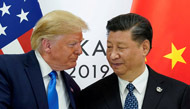The Unrealistic Reunification of Two Koreas

<뉴욕타임스>

Jordan Lee Beverly Hills HS 11th Grade
The recent discussions between North and South Korea are, undoubtedly, some of the most significant meetings of the modern era. If successful, the summit could officially end the long forgotten Korean War. This clash between North and South Korea has been decades long and has shown little signs of improvement. Recently, both parties agreed upon a conference to discuss the state of their division as well as their possible reconciliation. However, it is difficult to believe that these two discrete relatives could reconcile their differences due to their radically opposing views on politics and economics. How could one nation and its antithesis come to a peaceful agreement? Understanding the history of the Korean Peninsula is essential to comprehend why a peaceful relationship between the Democratic People’s Republic of Korea and the Republic of Korea is seemingly impossible.
In an attempt to mend their relationship, North and South Korea met in 1992 with the Agreement on Reconciliation, Non-Aggression, and Exchanges and Cooperation between South and North Korea. They met again in 2007 with the “peace declaration”. These previously failed attempts at reconciliation were a result of their differences of political opinions. This reveals that it is neither simple nor immediate for the two nations to set aside their differences. As a result, the meeting on April 27, 2018 to discuss denuclearization and reconciliation seemed unpromising. After hours of discussion and introduction of their respective cultures, both parties had seemed hopeful for what the future had to offer. Foreign nations were filled with anxiety as the results of these discussions were largely unknown.While the South employs a democratic republic, one in which the citizens elect their representatives and president, the North has maintained a dictatorial dynasty since its post-Korean War formation. How can reconciliation lead to the reunification of these distinct nations? Their radically different views on foreign and domestic policies makes this a near-impossible objective. It is difficult to work with one’s enemy and even more so when both parties want to drive the other out of existence. Due to the North’s long mission to reunify the Korean Peninsula under the Kim Dynasty’s control, reconciliation would be near impossible without the abandonment of that mission.
During the peace talks, both Koreas are also taking into consideration the economic effects of reunification. Many analysts question how the wealth of South Korea would transfer to North Korea. Would North Korea reap the fruits of South Korea’s labor? North Korea is in a state of poverty in comparison to the rest of the world. With a GDP of 12.38 billion USD, North Korea has a mere 0.88% of the GDP of South Korea. This means that South Korea will have to aid its poverty stricken Northern counterpart out of the hole it dug itself. This will leave many implications on the condition of the relationship between the two nations. The almost parasitic DPRK will utilize South Korea to build itself up and deplete the South of its wealth. For example, North Korea uses Cold War era machines and vehicles while South Korea has the luxury of modern technology. Economically, the South produces exports such as food, media, cars, and so much more, while the North accepts imports of food donations from foreign nations. The North is barely surviving, and there does not seem to be a viable future for a positive relationship between the two nations. The fact that a majority of the North Korean population lives in stark conditions says that reunification is not plausible. The South would have to sacrifice trillions of dollars to rebuild infrastructure and other essentials and would most likely suffer a possibility of inflation on all consumer products.
Despite hopes of reunification, the realistic possibility is slim to none. Due to the long history of numerous failed attempts and economic differences, the likelihood of a sustainable relationship is nearly impossible. The North’s views on the rest of the world is also a factor, especially concerning the United States as a major ally to South Korea. With so much military support from the US, South Korea is well prepared to defend itself; however, the North Koreans may be hesitant to comply and become aggressive once again as they have been in the past. There is no certainty as to what the results of these “peace” talks will bring, especially when they are littered with secret agendas amongst other factors. The two entities must compromise and sacrifice if they want to realize their fantastical dream. A unified Korea would be a sight to see; however, the two nations must consider all the possible consequences they may encounter as a result of reunification.
<Jordan Lee Beverly Hills HS 11th Grade>
스마터리빙
more [ 건강]
[ 건강]이제 혈관 건강도 챙기자!
[현대해운]우리 눈에 보이지 않기 때문에 혈관 건강을 챙기는 것은 결코 쉽지 않은데요. 여러분은 혈관 건강을 유지하기 위해 어떤 노력을 하시나요?
 [ 건강]
[ 건강]내 몸이 건강해지는 과일궁합
 [ 라이프]
[ 라이프]벌레야 물럿거라! 천연 해충제 만들기
 [ 건강]
[ 건강]혈압 낮추는데 좋은 식품
[현대해운]혈관 건강은 주로 노화가 진행되면서 지켜야 할 문제라고 인식되어 왔습니다. 최근 생활 패턴과 식생활의 변화로 혈관의 노화 진행이 빨라지고
사람·사람들
more
“합창단의 풍성한 하모니”
남가주 한인음악가협회(회장 오성애)가 주최하는 ‘2025 코랄 페스티벌’이 오는 11월2일(일) 오후 6시 어바인의 베델교회(18700 Har…

김주희 제이월드 대표 인재경영대상 특별상
김주희 제이월드그룹 대표가 지난 25일 사단법인 한국인사관리학회가 제정한 글로벌 인재경영대상 특별상을 수상했다. 김 대표는 글로벌 HR과 조직…
건국대 국제재단 창립 기념행사 성황
건국대 국제재단(이사장 이중열) 창립 기념행사가 지난 22일 부에나팍 힐튼 호텔에서 원종필 건국대 총장과 이중열 국제재단 초대이사장, 마크 정…
파사데나장로교회, 오페라와 한국 가곡의 밤
파사데나 장로교회(담임목사 최진영)가 주최한 ‘오페라 아리아와 한국 가곡의 밤’ 음악회가 지난 19일 성황리에 열렸다. ‘이웃을 향한 문화기획…
실비치 레저월드 한인커뮤니티교회 탐방여행
실비치 시니어타운 내 레저월드 한인커뮤니티교회(LWKCC·담임목사 용장영)는 창립 15주년을 맞아 지난 19~25일 제6차 가족여행을 진행했다…
많이 본 기사
- [이런 일도] 무일푼 인생 산 60세 트럭기사… 병원 실수로 뒤바뀐 ‘금수저 아기’였다
- “최저임금·오버타임 못받았다” 미주중앙일보, 집단소송 당해
- 조지아 구금사태 재발 막는다… “새 비자 계획 수립”
- ‘소수계 우대제’ 폐지하니 아시안 입학 늘었다
- 민주평통 수석부의장 이해찬 전 총리 내정
- 한인 유권자 22만 넘었다… 투표율은 낮아
- 샌타애나 강풍 영향 주중 90도 폭염 예보
- 연방 교통당국, 테슬라 자율주행 또 조사
- 설운도 子 이승현, 근황 “건물주 아들..평생 문제 없어”
- 류시원 ‘10개월 딸’, 깜짝 공개..19세 연하 아내는 뒷모습도 ‘초동안’
- 히말라야 등반 또 사망 60대 한국인 시신 발견
- 서머타임 해제로 미주노선 출도착 시간 변경
- 호박 풍년
- 은가은♥박현호, 결혼 6개월만에 전한 2세 소식..심진화·이은형도 축하
- 트뤼도·페리 공식 연인관계 파리 공연장에서 나란히
- ‘날강도’로 변한 미국
- 트럼프 입김에 살아난 ‘아르헨티나의 트럼프’
- AI가 과자봉지를 총으로 오인해 신고
- 가장 위험한 프리웨이는 805번
- 합법적 절세 방법
- 클라라, 이혼 후 첫 심경 “남은 올해 행복 가득하길”
- ‘아시아 야구’ 존중했던 다저스, WS 2연패로 결실 보나
- 60년간 3천곡, 다큐로 되살린 김희갑의 삶… “가슴 벅차네요”
- 92세 대통령 8선 승리… 카메론 ‘대선 부정선거’ 논란
- 한인 유권자 22만 넘었다… 투표율은 낮아
- 주한 미국 대사대리에 케빈 김 부차관보 임명
- 아마존 역대 최대 감원 본사·사무직 3만명 규모
- 미주 각 지역 평통회장 경쟁 치열
- 가주는 ‘친환경차 천국‘… 신차 판매의 3분의 1
- 법 몰랐다는 고용주의 무지는 변명이 안 돼
- 김주희 제이월드 대표 인재경영대상 특별상
- 우로보로스, 상호 출자, 그리고 버블
- 침묵의 장기 ‘간’… 수치 정상이라도, 안심 금물
- 아토피에 가려워 밤새 긁어대는 아이… “혹시 ‘이것’ 즐겨 먹나요”
- VA 자동차 재산세 폐지될까
- [화제의 장수 기업] “양복과 함께 반백년… 세상 하나뿐인 명품 제작 자부심”
- 보잉 노조협상 난항… 파업 장기화
- ‘셧다운’ 항공기 지연 주말새 8,600편
- 미·중, 파국은 피했다
- 딥시크 앞세운 중국 첨단무기 개발 박차
- [지평선] 욕망도 ‘내로남불’
- ICE, 북VA서 유학생 불법고용업체 색출 나서
- [화요칼럼] 역사 산책
- “합창단의 풍성한 하모니”
- 9월 소비자물가 전년대비 3.0%↑
- AI 영수증 사기의 충격, 기업 손실 ‘폭증
- “생활비·주거비, 조금 더 저렴한 주 찾아 떠난다”
- [산 식당] 소주·맥주·막걸리 단돈 9.99달러
- ‘순두부’
- [SA 슈올즈] 전 제품, 이달까지 20% 할인 세일
1/5지식톡

-
 테슬라 자동차 시트커버 장착
0
테슬라 자동차 시트커버 장착
0테슬라 시트커버, 사놓고 아직 못 씌우셨죠?장착이 생각보다 쉽지 않습니다.20년 경력 전문가에게 맡기세요 — 깔끔하고 딱 맞게 장착해드립니다!장착비용:앞좌석: $40뒷좌석: $60앞·뒷좌석 …
-
 식당용 부탄가스
0
식당용 부탄가스
0식당용 부탄가스 홀세일 합니다 로스앤젤레스 다운타운 픽업 가능 안녕 하세요?강아지 & 고양이 모든 애완동물 / 반려동물 식품 & 모든 애완동물/반려동물 관련 제품들 전문적으로 홀세일/취급하는 회사 입니다 100% …
-
 ACSL 국제 컴퓨터 과학 대회, …
0
ACSL 국제 컴퓨터 과학 대회, …
0웹사이트 : www.eduspot.co.kr 카카오톡 상담하기 : https://pf.kakao.com/_BEQWxb블로그 : https://blog.naver.com/eduspotmain안녕하세요, 에듀스팟입니다…
-
 바디프렌드 안마의자 창고 리퍼브 세…
0
바디프렌드 안마의자 창고 리퍼브 세…
0거의 새제품급 리퍼브 안마의자 대방출 한다고 합니다!8월 23일(토)…24일(일) 단 이틀!특가 판매가Famille: $500 ~ $1,000Falcon: $1,500 ~ $2,500픽업 & 배송직접 픽업 가능LA…
-
 바디프렌드 안마의자 창고 리퍼브 세…
0
바디프렌드 안마의자 창고 리퍼브 세…
0거의 새제품급 리퍼브 안마의자 대방출 한다고 합니다!8월 23일(토)…24일(일) 단 이틀!특가 판매가Famille: $500 ~ $1,000Falcon: $1,500 ~ $2,500픽업 & 배송직접 픽업 가능LA…
케이타운 1번가
오피니언
 조환동 편집기획국장·경제부장
조환동 편집기획국장·경제부장 ‘날강도’로 변한 미국
 민경훈 논설위원
민경훈 논설위원우로보로스, 상호 출자, 그리고 버블
 이태규 서울경제 워싱턴 특파원
이태규 서울경제 워싱턴 특파원 미·중, 파국은 피했다
 박영실 시인·수필가
박영실 시인·수필가 [화요칼럼] 역사 산책
 이영창 / 한국일보 논설위원
이영창 / 한국일보 논설위원[지평선] 욕망도 ‘내로남불’
 김남극
김남극 ‘순두부’
 옥세철 논설위원
옥세철 논설위원‘물은 지정학적 도구’… 국지적 폭력갈등 빈발

노년의 보약 - 여행
 메건 매카들 워싱턴포스트 칼럼니스트 / CNN ‘GPS’ 호스트
메건 매카들 워싱턴포스트 칼럼니스트 / CNN ‘GPS’ 호스트 [메건 매카들 칼럼] 학계에 일방적으로 유리한 부당거래
1/3지사별 뉴스

쿠오모, 플러싱서 ‘한인 표심’ 공략
내달 4일 치러지는 뉴욕시장 선거를 앞두고 무소속으로 출마한 앤드류 쿠오모 전 뉴욕주지사가 퀸즈 플러싱 한인타운을 방문해 지지를 호소했다. 쿠…
아담스 시장, 쿠오모 공식 지지 선언

VA 자동차 재산세 폐지될까
버지니아 주지사 선거를 앞두고 차량세 폐지가 주요 이슈로 부상했다.버지니아에서는 차량 구매 시 4.15%의 세금이 부과되며 차량 소유주는 매년…
ICE, 북VA서 유학생 불법고용업체 색출 나서

한인 유권자 22만 넘었다… 투표율은 낮아
캘리포니아의 선거구 임시 재조정에 대한 유권자의 찬반을 묻는 11월4일 특별선거가 이제 1주일 앞으로 다가온 가운데 이번 특별선거에 투표 자격…
트럼프, 29일 경주서, 1박2일 방한 발표

오늘 하루 이 창 열지 않음 닫기 



















































.png)


댓글 안에 당신의 성숙함도 담아 주세요.
'오늘의 한마디'는 기사에 대하여 자신의 생각을 말하고 남의 생각을 들으며 서로 다양한 의견을 나누는 공간입니다. 그러나 간혹 불건전한 내용을 올리시는 분들이 계셔서 건전한 인터넷문화 정착을 위해 아래와 같은 운영원칙을 적용합니다.
자체 모니터링을 통해 아래에 해당하는 내용이 포함된 댓글이 발견되면 예고없이 삭제 조치를 하겠습니다.
불건전한 댓글을 올리거나, 이름에 비속어 및 상대방의 불쾌감을 주는 단어를 사용, 유명인 또는 특정 일반인을 사칭하는 경우 이용에 대한 차단 제재를 받을 수 있습니다. 차단될 경우, 일주일간 댓글을 달수 없게 됩니다.
명예훼손, 개인정보 유출, 욕설 등 법률에 위반되는 댓글은 관계 법령에 의거 민형사상 처벌을 받을 수 있으니 이용에 주의를 부탁드립니다.
Close
x